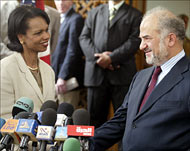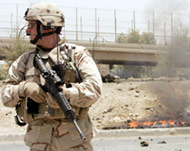Bush: No withdrawal timetable for Iraq
US President George Bush has assured Iraqi Prime Minister Ibrahim al-Jaafari that “there are not going to be any timetables” for withdrawal of American forces.

Buoyed by Bush’s reassurance, the Iraqi prime minister also told a joint news conference at the White House on Friday that “this is not the time to fall back”.
Fielding questions hours after the latest attack on a US military convoy left an unknown number of American troops dead, Bush conceded that it bothers Americans to see scenes of carnage on television.
Speaking of the armed opposition in Iraq, Bush said: “There’s no question there’s an enemy that still wants to shake our will and get us to leave. …They try to kill and they do kill innocent Iraqi people, women and children because they know that the carnage that they reap will be on TV and they know that it bothers people to see death.”
 |
|
The Iraqi prime minister thanked |
“And it does. It bothers me. It bothers American citizens. It bothers Iraqis,” Bush said.
Bush and al-Jaafari fielded questions after receiving a briefing from the top commanders overseeing the US military presence in Iraq.
Bush said setting a timetable for withdrawal of the American forces would only prompt the armed opposition to “wait us out”.
Stubborn Bush
He said he would stay the course in Iraq despite public opinion polls showing dwindling support for his policy. He indicated his awareness of his domestic critics when a reporter began asking a question about whether he was concerned about a “slump” in his support.
“Quagmire?” the president asked, employing a word that some Democrats in Congress have begun to use to describe the military presence in Iraq one year after the transfer of sovereignty.
An AP-Ipsos poll this week showed public doubts about the war reaching a high point – with more than half saying that going to war in Iraq was a mistake.
The Iraqi prime minister seemed to recognise the domestic pressure on the president.
“You have given us more than money,” said al-Jaafari, who visited wounded American troops on Thursday night at a military hospital in the capital. “You have given us your sons, your children, that were killed beside our own children in Iraq. This is more precious than any other support we have received.”
Mounting toll
More than 1700 American troops have died in Iraq, the majority of them since the end of hostilities aimed at toppling the government of Saddam Hussein. There have been 479 car bombs in Iraq since the handover of sovereignty on 28 June 2004, according to an Associated Press count.
 |
|
Daily attacks are taking a heavy |
An Iraqi reporter asked the two men when reconstruction would begin in the war-torn country.
Bush said he did not want to be “passing the buck,” but looked at al-Jaafari and said “they’re in charge,” meaning the Iraqis.
In opening remarks, Bush said: “The enemy’s goal is to drive us out of Iraq before the Iraqis have established a secure democratic government. They will not succeed.”
On Thursday, al-Jaafari confidently predicted that a constitution to guide his country towards democracy would be concluded by the end of August and then ratified in a popular referendum.
“We are going to do it within two months,” al-Jaafari said as he inspected the US constitution in the dimly lit, cool rotunda of the National Archives. Asked if it would be approved by the Iraqi people in the autumn, he replied, “Yes.”
Sign of weakness
In the meantime, the US-led forces must stay in Iraq until Iraqi forces are fully prepared to defend the country by themselves, al-Jaafari said.
The setting of a timetable for the withdrawal of foreign forces would be a sign of weakness, he said. “The country would be open to increased terrorist activity,” he told the private Council on Foreign Relations.
However, the International Crisis Group, a private advocacy group based in Brussels, Belgium, has recommended that the drafting deadline be extended for six months, or to next February, “to allow for public education and broad consultation”.
|
“There’s no question there’s an enemy that still wants to shake our will and get us to leave” George Bush, |
Writing a constitution is critical to the country’s stability, the report said.
Al-Jaafari made a stop at the White House on Thursday to review strategy with Vice-President Dick Cheney and Bush’s national security adviser, Stephen Hadley.
He went to the archives, met with congressional leaders on Capitol Hill and visited Walter Reed Army Medical Centre to express gratitude to US troops wounded in his country.
Dwindling support
An Associated Press-Ipsos poll this month found just 41% of adults supported Bush’s handling of the Iraq war, a new low.
Continued bloodshed underscores comments from the top American commander in the Gulf, who told lawmakers on Thursday that the armed opposition has not grown weaker over the past six months.
“I believe there are more foreign fighters coming into Iraq than there were six months ago,” General John Abizaid said during a contentious Senate Armed Services Committee hearing.
The testimony undercut Cheney’s recent assertion that the armed opposition was in its “last throes”.